3 - SOCIAL MAN VERSUS HOMO ECONOMICUS
Published online by Cambridge University Press: 02 December 2009
Summary
During the twelfth and thirteenth centuries at least 50 cathedrals were built within the geographical limits of contemporary France. For the society of that time this represented an overpowering investment the magnitude of which was probably (in relative terms) comparable to the one required for the construction of the railroad network in the second half of the nineteenth century. Was it a rational investment? Obviously the answer very much depends on how economic rationality is defined. In the eyes of the people of the twelfth century it was undoubtedly the right decision, for no other activity was deemed more worthwhile than to celebrate the glory of God. For twentieth-century Americans or Europeans it is certainly difficult to imagine to what extent religion permeated the society of that time. Education, common law, intellectual life, government, every aspect of social life was deeply influenced by religion. For instance, about one half of all the books published in the seventeenth century were concerned with religious topics (Bendix 1978); although we do not have a similar statistic for the twelfth century it can be assumed that the proportion was even higher.
One might think that nowadays at last, the definition of “rational economic behavior” is fairly well established, but that is probably only because we lack the benefit of hindsight. It is no longer the celebration of the Glory of God which is our ultimate aspiration, but it is hardly more rational to consider that no expense should be spared for the preservation of health; after all, once we are dead, the people of the twelfth century would reason, do we not share the Glory of God?
- Type
- Chapter
- Information
- Patterns of SpeculationA Study in Observational Econophysics, pp. 39 - 54Publisher: Cambridge University PressPrint publication year: 2002



